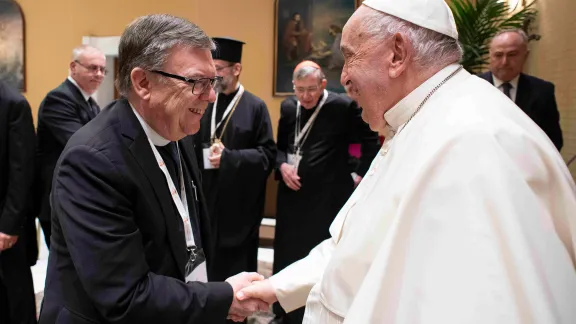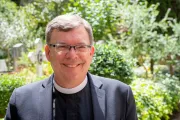
Prof. Dirk Lange, Assistant General Secretary for Ecumenical Relations, meets Pope Francis with other ecumenical delegates during the Synod. Photo: Vatican Media
Reflections on the final week of the 2024 Synod of Bishops
The final week at the General Ordinary Assembly of the Synod of Bishops was anything but ‘ordinary’! It was in fact extraordinary on several levels.
The discussion in small groups (“conversation in the Spirit”) concluded with a reflection on the ministry of the Bishop of Rome. You may remember when Pope Francis was elected and appeared for the first time on the balcony of St. Peter’s Basilica, he introduced himself as the Bishop of Rome. That was a first for a Roman Pontiff. With this introduction, he already signaled a change in style and conception of the Petrine ministry. Now, in the Instrumentum Laboris (the working document and basis for conversation during the Synod), the role of the Bishop of Rome was addressed as ‘servant of unity’ but also as ‘guardian of the synodal way’. These two belong together in a unique way, a way which has great ecumenical potential.
In an earlier blog post “Pathways and places of encounter”, I referred to the concept of synodal authority as opposed to pyramidal authority that was at the heart of many discussions. The Instrumentum Laboris cites an important study produced by the Dicastery for Promoting Christian Unity entitled “The Bishop of Rome” that provides several criteria for understanding a sound decentralized primacy. It cuts through many ‘myths’ or unhelpful narratives and conceptions we might have concerning the primacy of the Bishop of Rome. An important aspect of the synodal and ecumenical task comes to the forefront: it is a return to the sources, stripping away many unnecessary embellishments so that the unique and important ministry of the Bishop of Rome can be recognized.
Dialogue, discernment, decentralization
A synodal primacy is one in which the Bishop of Rome, as servant of unity in reconciled diversity, opens a space for all, for dialogue, for discernment, for walking together and for sharing gifts, yes, even sacramental gifts. The Bishop of Rome is guardian of synodality, that is, of the participation of the People of God on all levels of decision-making and nurturing relationality. The reorientation proposed by the Synod, which it called ‘sound decentralization’, is actually what Lutherans would call reform, for it seeks to retrieve the deep Gospel intuition behind our institutions, ministries, and calls. What makes present the Gospel of God’s mercy is the first criterion of sound decentralization. I am deeply impressed and grateful for the redirecting of authority away from power towards sharing, away from privilege towards confessing the Gospel of Jesus Christ, the Gospel of liberating grace, in our day.
The ecumenical potential was highlighted by almost all participants. Two ideas grounded the ecumenical impulse at the Synod: 1. The discussion on the role of the Bishop of Rome and 2. The discussion on the notion of “exchange of gifts.” There is of course an exchange on many levels in the life of the church. There is an exchange of gifts within the Catholic Church itself between cultures and traditions and especially between the Eastern and Latin rites. But there is the broader exchange with those churches and ecclesial communities who are not in communion with the Bishop of Rome. This exchange was marvelously highlighted in the liturgy of the 2016 Joint Commemoration of the 500 Years of Reformation in Lund Cathedral, when Pope Francis co-presided with LWF leaders. He gave thanks for the many gifts that the Reformation contributed to the church, the first being the centrality of the Word of God.
A new model of decision-making
The first part of the fourth week was spent discussing an initial draft of the final document. Over a thousand comments and suggestions were submitted from the round table discussions. The drafting team had the enormous challenge compiling these comments and producing the Final Document (plus translating it into English, French, Spanish, and Portuguese)! On Saturday morning, we gathered at our tables in the Paul VI Hall. There had been no time to print copies, so we worked on our screens. During the three-hour morning session, we read the text in silence, making notes and praying. The silence was palpable. It was a unique experience to be with 350 other persons reading a text “together.” The document brought me much joy as I noted the important place given to ecumenism but also as I noticed some bold steps taken, such as leaving open the question of ordination of women to the diaconate. In the afternoon we reconvened as members voted on the document, paragraph by paragraph. A two-thirds majority was required for each paragraph. Every paragraph achieved that threshold. After more than two hours of voting, the entire document was approved.
Then Pope Francis spoke. He welcomed, approved, and gave thanks for the document. Then he made a historic announcement saying he will not write an Apostolic Exhortation or make any amendments. “What we have approved is enough,” he said. In other words, the voice of the Synod – lay and ordained, women and men – has magisterial value. For the first time, synodal authority was being exercised. It was an incredibly moving moment and joy overflowed in the Aula. The text itself may not always seem groundbreaking in its proposals, but it has set in motion a renewed consideration of how the church functions in its structure and in its mission. The hope of the “Final Document” (to be published soon in English) calls for our prayers for a robust implementation and challenges us to reconsider the commitment of our own communions to synodality.



